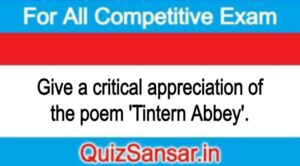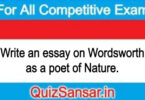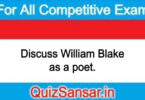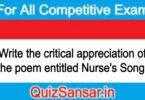
Give a critical appreciation of the poem ‘Tintern Abbey’.
Give a critical appreciation of the poem ‘Tintern Abbey’.
Ans.
“Tintern Abbey is a piece of highly accomplished verse, conceived and composed into full blood of creative activity.”
Introduction
Tintern Abbey, a poem, a story of poet’s innermost thoughts and feelings, was published in the first edition of Lyrical Ballads 1798. It was the last poem in the poetic volume. It bore the long title. Lines Composed A few Miles Above Tintern Abbey On Revisiting The Banks of the Wye During A Tour. July 13, 1798′. What is surprising is that ‘being an effort of an immature youth it is the maturest poetic gift for English literature till today. Wordsworth got the poetic inspiration to compose this poem from the soul of Nature pervading the Wye and its surroundings. It was written at a time when Wordsworth was at the heights of his poetic career; poem recalls his first visit to Tintern in 1793. In those early years, Wordsworth was a youngman to intoxicate himself with the wind of nature’s sensous sights and sounds. But when he visited the place second time in 1798, he was a new Wordsworth, who had now lost away his vision of looking the former beauty of the nature.
Poetic Thought
In it we find a graphic account of the evolution of the poet’s attitude towards Nature. Three stages can be traced in the course of this evolution.
The poet is on the banks of the Wye again after five years. Memories of the beautiful sights of Nature have given him great joy and peace in noisy towns and cities, and inspired him for kindness and love. Their memories have also led him into a state of super consciousness. In that state his soul rises above the defining barriers of the body and the mind, by virtue of the great peace and deep power of spiritual joy. This soul sees into the nature of things. It is not a vain belief. For whenever the burden of the world has oppressed his heart. he has often turned his mind to the Wye, to have a “blessed mood’. The poet then recollects the memories of the nature objects. After an initial difficulty ‘the picture of the mind revives again’. This incidentally leads him to contrast his present attitude to Nature with that of his boyhood days. Then the beauty of the Nature in the Wye valley gave him sensuous pleasure. Like a small deer he raw up the mountain sides and wherever Nature led him. He describes his activities as his ‘glad animal movements. The sensuous pleasure he gets from Nature are described by him as ‘aching joys’ and ‘dizzy raptures’.
Soon his vision of Nature widened. He came to look upon man as an essential part of Nature. And he begins to hear ‘oftentimes the still, sad music of humanity’. And then Nature becomes the anchor of his purest thoughts, the nurse, the guide the guardian of his heart and soul of all his moral being”.
Autobiographic Charm
The poem is a piece of autobiographic charm. It is not imagined but an experienced expression. After five years, Wordsworth revisits the river Wye, a few miles above Tintern Abbey. Wordsworth himself accepts, ‘No poem of mine was composed under circumstances more pleasant for me to remember than this.”
Once again he is elated to see the landscape. The experience of the beautiful scenery has always been in his mind, even when he has left the scene itself. The pleasure of ‘blessed mood’ gained after a gap of five years brings to the poet undescribable gifts. He not only gets joy for the present but also gets food fo: future pleasures. Thus Tintern Abbey is a heart felt experience of the poet.
Development of His ‘Blessed Mood’-Attitude Towards Nature
Wordsworth writes on love between man and Nature and between man and man. The poem ‘Tintern Abbey’ is the sincerest record of Wordsworth’s attitude towards Nature.
With the passage of time his faith in Nature goes deeper and deeper. There was a time when Nature was but a playground for his ‘animal movements’ and ‘coarser pleasures’ ‘when like a roe, he bounded o’er the mountains. And then there comes another stage of Nature love. But finally Nature became the anchor of his purest thoughts and the nurse, the guide and guardian of his heart.
Technical Beauty
Language; Diction: The language of the poem is not simple by the standard of his own theory of poetic diction. Further his poetic sentences are long and complex with emotional depth. But it is all spontaneous and not a well planned idea.
Dignified and Elevated Style: The poem is marked by a dignified and elevated style that suits the loftiness of its theme. Wordsworth shows his unmistakable genius of using such highly expressive phrases as ‘Fretful stir unprofitable’, ‘the still sad music of humanity’, ‘the sounding cataract haunted me like a passion’, ‘aching joys and dizzy raptures etc.” Wordsworth also uses the double exposure style. He juxtaposes two different periods of time-the past and the present to enable us to trace the development of his passion for Nature. It creates difficulties for the reader here and there. On the whole the style of the poem is romantic.
Structure (Metre, Rhythm, Stanza): This long poem contains one hundred and sixtytwo lines. The verse is blank verse. The metre, in the longest lines, is iambic pentameter. And the shortest line is a verse of one iambic feet. Although the metre of the poem is iambus, yet the verses are of unequal lengths. The verses are highly rhythmic. The flow of the rhythms is spontaneous, yet measured by the principles of music. The poet wanted to make the poem an Ode but later he changed his mind. He writes,
‘I have not ventured to call this poem an ode : but it was written with a hope that in transitions and the impassioned music of the versification, would be found the principal requisites of that species of composition.”
The poem is divided into stanzas of uneven lengths. In the scheme of poetic construction they stand as thought units connected with one another by the stream of emotion.
- What is meant by Database Management System?
- Discuss the advantages and drawbacks of database.
- What do you mean by database ? Discuss its Characteristics.
- What is Data Mining?
- What are the conditions of communication?
- What do you mean by business communication ?
- organization / Differentiate between classical and modern theory of organization
- What is forecasting






